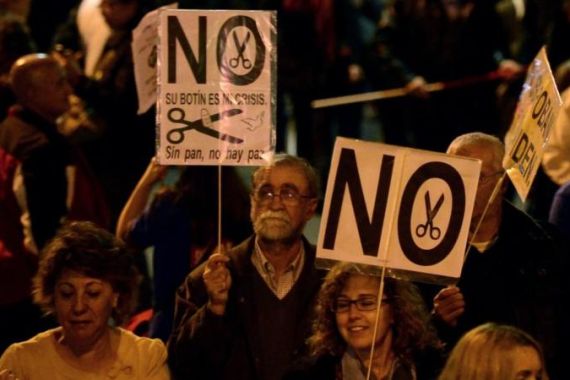Say goodbye to PIGS and GIPSIs
Tinkering with the words will not fix Europe’s economic problems, but can stop reproducing negative public perceptions.

During the first presidential debate, Republican Party standard-bearer Mitt Romney worried that the United States might “go down the path to Spain”. In the second debate, he declared that the re-election of President Obama would put the US on the “road to Greece”. With their high debt levels, shrinking economies and turbulent social protest, Spain and Greece stood not just for economic catastrophe, but also for political and moral failure.
Nor are these countries the only ones that have been cast in this role. Financial professionals as well as scholars frequently focus on the “periphery” of the eurozone as particularly problematic. Because these folks are such a lively and fun-loving bunch, they have coined the terms PIGS and GIPSI, acronyms that the media has at times embraced with relish.
Prior to the current crisis, PIGS stood for the “Club Med” Southern European countries of Portugal, Italy, Greece and Spain. Over the past few years, bailout recipient Ireland has had the honour of replacing Italy as a PIGS member. GIPSI rotates the letters in kaleidoscopic fashion to identify all five faltering European economies, though some prefer simply to extend the PIIGS metaphor.
These acronyms are catchy and memorable. But they are not helpful. Associating these fragile national economies with potentially derogatory terms reinforces a perception that Europe is divided between the core and the periphery, the central and the marginal, the successful and the needy, the worthy and the unworthy.
Invocation of good and evil
This indirect invocation of good and evil dovetails with the assumption that the eurozone crisis is rooted in profligate spending and lazy citizens in irresponsible countries. Many scholars argue these factors – if they are true at all – are at best pieces of a large and complex puzzle. Others assert that they are no more than red herrings that distract from the fundamental underlying causes of the eurozone problems.
There are almost as many analyses of the economic crisis as there are authors writing about it. Some lay the blame on the initial institutions that established the euro; others note that the contemporary near-collapse has its origins in poor decision-making by banks in wealthy countries; still others emphasise that imposing austerity on fragile countries inhibits growth and prevents them from a quicker recovery, which suggests that more generous intervention from stable countries could help the precarious economies and societies.
Each of these diagnoses lays the blame – to the extent they engage in the blame-game inherent in many of these debates – squarely on decisions taken in countries like Germany, France and the United Kingdom. Yet bond market analysts, journalists and scholars have not developed an acronym for these countries.
We could have some fun with this. Take the four capitalised letters in these countries’ names and put a hyphen between the “G” and the rest. This two-syllable acronym would describe a set of states that share important traits – they have wealth, power, relative stability and leadership potential in the European Union. But that would not justify the term, however useful it may be. It would be inappropriate because it sounds derogatory. It would convey a moral judgement, not just a description.
The same is true for PIGS and GIPSI. For most readers, “pigs” and the homonym “gypsy” elicit negative associations. They induce a reaction and a judgement. According to Bloomberg News, as early as 2010, Italian bankers recognised this by arguing their country was not one of the PIGS.
Negative public perceptions
In the same year, both the British bank Barclays and the Financial Times made efforts to squelch the term among their staffs. Writers in the Spanish daily El Pais have complained about the use of PI(I)GS on multiple occasions. This debate is more than just a tempest in a teacup – it has been the subject of controversy and concerted policy decisions within august institutions.
If a rose by any other name smells as sweet, it is equally true that these countries remain economically troubled no matter what label we attach to them. Spain, Portugal, Ireland, Greece and to some degree, Italy, have fallen on hard times. They are not the only countries in the eurozone confronting difficulties, but naming this group may have its place.
I propose GISP and SPIGI. Not only do these terms distinguish the variable position of Italy in the mix (appropriately, by ending the second acronym with a vowel), they do not generate immediate negative associations and moral judgements. They render this group more like the BRIC or BENLUX nations – simply a set of similar countries.
Tinkering with the words will not fix Europe’s economic problems. It won’t make the Germans love the Greeks, nor the Greeks stop resenting the Germans. But by using GISP and SPIGI instead of PIGS and GIPSI, scholars and opinion leaders will at least stop reproducing negative public perceptions. In this small way, those who analyse contemporary politics can help encourage a less judgemental and more productive approach to the eurozone crisis.
Erik Bleich is professor of Political Science and Director of International Politics and Economics at Middlebury College and is the author of The Freedom to Be Racist? How the United States and Europe Struggle to Preserve Freedom and Combat Racism, published by Oxford University Press.
Follow him on Twitter: @ErikBleich1
